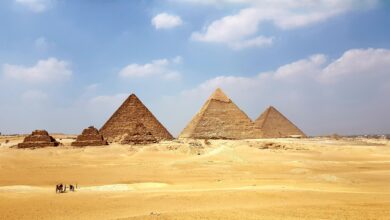Unrelated events find a common link as if by coincidence, becoming a whole story. I was reading a book about the life of Robert Oppenheimer, the American physicist who directed the Manhattan Project, which developed the world’s first nuclear bomb, when I heard about the return to Egypt of former International Atomic Energy Agency director Mohamed ElBaradei. The event, it seems, has moved the still waters of Egyptian politics. Hopefully, it will also inspire other discussions.
Regardless of how the event is viewed, ElBaradei’s return should bring the issue of the Middle East’s nuclear weapons back into the open. Until now, the subject has been shrouded in ambiguity.
Our Arab region, which suffers from tensions and disturbances, is in an unusual situation. Israel conceals its possession of nukes but does not deny it. On the other hand, Iran openly declares its intention to use nuclear technology without developing weapons. In the middle of this are the Arab states, who are confused by the contradictory claims of Israel and Iran, and who are forced to take a "wait-and-see" approach.
That is why I found it important to revisit the circumstances surrounding the development of the first nuclear bomb–described in the book about Oppenheimer–as a way of contemplating the future.
The book was published four or five years ago. It won several prizes and was considered the best book on the topic. It’s not only a biography of Oppenheimer, but it provides a description of scientific and technological hardships encountered during the development of the first nuclear bomb.
The book also examines the personal and psychological repercussions for the individuals involved–who were of diverse political affiliations. A large part of the scientists working on the project were leftists, some being members of the Communist Party. They were also of different ethnicities: some were Jews, and some came as migrants from Germany, Hungary, and Poland.
Although the first bomb was US-made, the idea of nuclear fission was born in Germany, and the US was pushed to develop the bomb by beaten to it by Germany.
The book narrates how the idea of a nuclear bomb evolved. Physicist Louis Alvarez was in a barber shop, browsing the the San Francisco paper, when he read about two German chemists who had managed to prove that a uranium atom is fissionable. Discussing the issue with Oppenheimer–at that time one of the most famous physicists–he argued that the idea was theoretically impossible. They wrote out some mathematical equations, and discovered it was indeed possible. They even became enthusiastic about the idea.
The book reviews Oppenheimer’s life and the signs of his early genius. It tells how he suffered from depression. He was the son of a wealthy Jewish family of German origin, although he denied this fact at the beginning of his life. Oppenheimer was erudite, with interests in poetry, the arts and music. He had a gift for learning new languages such as Latin, Greek, French, Dutch, and Spanish. He was fond of ancient Indian philosophy.
Oppenheimer manifested leftist inclinations, and had links with the Communist Party, though he was not an official member. This was mirrored in his Manhattan project and what followed. He was selected as the scientific and technical manager for the project after overcoming strong objections from security and intelligence, who considered him a security threat, given his leftist and communist ties. He was later excluded from a role in a plan to produce a hydrogen bomb for the same reasons, despite the success of the first project.
I don’t want to analyze the details of Oppenheimer’s story. Instead, I intend to highlight some important points, particularly the regret Oppenheimer felt–like many other scientists–at the beginning of the project or at its conclusion, when the bomb was dropped on Japan.
This suffering can be attributed to a question about the world’s responsibility for balancing science and technology on one hand, and ethical values on the other. Manufacturing a nuclear bomb is not simply a step forward in the advancement of technology. It can also lead to consequences that go against moral values. It is not only a weapon to be used against enemy forces, but a tool that brings total devastation to both combatants and civilians, not to mention the shared environment. So, what should be the world’s position?
Oppenheimer and other scientists had these questions in mind, but they were compelled by a more pressing concern. It was not whether to make the bomb or not, but rather whether the United States or Germany would make it first.
There was a firm belief–supported by some information–that the Germans were already working on the bomb, encouraged by that country’s scientific and technological knowledge. That was the pretext US scientists relied on in their project. And that’s why, when Germany surrendered in 1945, before the bomb was developed, many scientists believed there was no need to resume the project.
A good example of such a scientist was Szilard, a Hungarian Jew who wrote a joint letter with Einstein which they sent to President Roosevelt, inviting him to manufacture a nuclear bomb before the Germans did, to enable the US to gain control over Europe. Szilard himself then wrote a petition, signed by a large number of US scientists, demanding a halt to production of the bomb, claiming there was no need for it once Germany had surrendered.
There was also the Danish scientist Niels Bohr, the founder of quantum physics (a branch of science necessary for the production of the nuclear bomb), who objected to dropping the bomb on Japan without prior notification, or giving it the choice between surrendering or getting bombed. Bohr also saw a danger in monopolizing nuclear knowledge, arguing that it should be shared with scientists from other countries. He called for setting up an international agency to oversee the nuclear industry. Ideas about the prohibition of the use of nuclear weapons started to develop in the wake of World War II.
While scientists suffered from a morality-versus-technology dilemma, military officials and politicians did not. When the US finished the project in July 1945, there were early signs that Japan was ready to surrender, which meant there was no need to use the devastating new weapon. Yet the US had other considerations, such as depriving the Soviet Union from claiming the bounties of the war in the Far East. President Truman had concluded an agreed with Stalin that the latter would declare war on Japan on 15 August, 1945, which prompted the American president to order the bombing of Hiroshima and Nagasaki before that date.
The calculations of politicians and military figures were later disappointed: the Soviet Union was not eliminated from the Far East, and China fell into the grip of the Communist Party four years after the war, followed by North Korea and Vietnam.
Having discussed the history of the nuclear bomb regionally and internationally, what should be our stance? Egypt and other Arab states have announced that they want a nuke-free Middle East, but is this enough? How can we achieve that? And will this ensure regional safety and stability? Certainly ElBaradei’s presence in Egypt can help bring the issue back into the public discussion, with the hope of achieving a strategy that serves our region.
Translated from the Arabic Edition.




